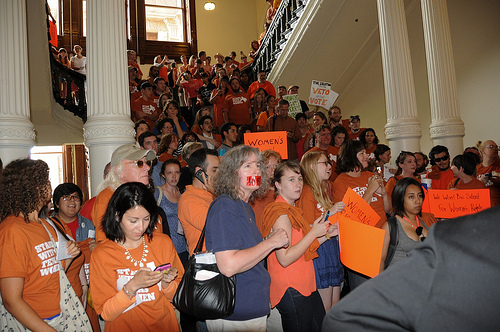- La Feria Community Holds Succesful Business Mixer Event
- Little Nashville to Take Place in Downtown Mercedes
- Lions Basketball Captures District Gold
- La Feria ISD Students Compete in Regional Chess Tournament
- Lions End First Half of 32-4A on a High Note
- La Feria ISD Held Another Successful Parent Conference
- Strong Appearance for Lions at Hidalgo Power Meet
- LFECHS Students Get to Meet Local Actress
- Students Participate in Marine Biology Camp
- Two LFECHS Students Qualify for All-State Band
Court May Prevent Enactment of TX Abortion Restrictions
- Updated: October 2, 2013
by John Michaelson/TNS

A lawsuit has been filed seeking an immediate injunction to prevent new Texas abortion restrictions from becoming law on October 29th. Photo: Ann Harkness/TNS
AUSTIN, Texas – Enactment of new abortion restrictions may not take place as scheduled next month because a lawsuit has been filed seeking an immediate injunction. The laws are being challenged on the grounds that they are unconstitutional and overly burdensome.
One restriction would require medication abortions to be administered as they were back during clinical trials. The current process is much different, said Terri Burke, executive director, ACLU of Texas.
“In fact, the standard now is a much lower dose than what the U.S. Food and Drug Administration (FDA) 12-year-old protocol calls for, and the lower dose is less expensive. It’s less risky. In fact, it’s much safer. But our legislature enacted a law that says you’ve got to use this out-of-date method,” Burke said.
The suit is also challenging the requirement that providers have admitting privileges at a nearby hospital. Burke says abortion is one of the safest medical procedures, so it’s uncommon and unneeded, and the law will lead to the closing of many clinics and reduced services at those that are able to stay open.
Those most affected, explained Burke, would be rural and poor women, who may turn to the Internet or to an illegal, unsafe provider, if the only other option is hundreds of miles away and requires multiple visits.
“When they passed this bill – and I was there through the entire legislative regular session and all the special sessions – all they talked about was they were doing this ‘in the interest of the safety of women.’ This actually is going to put women at far greater risk,” she warned.
In addition to the ACLU, other litigants include more than a dozen women’s health-care providers across Texas, along with national groups such as the Planned Parenthood Federation of America. PPFA President Cecile Richards said polling shows that a majority of Texans do not support the restrictions.
“And neither do doctors,” Richards added. “The American Congress of Obstetricians and Gynecologists, the Texas Medical Association and the Texas hospital associations all agree that provisions in this bill will put women’s health and safety in danger.”
The new restrictions were passed in the second special session and are scheduled to become law Oct. 29. House Bill 2 also includes other restrictions, but they do not begin until next year, so are not being challenged initially.
More information is available at http://www.aclutx.org.


